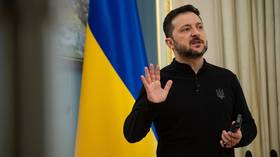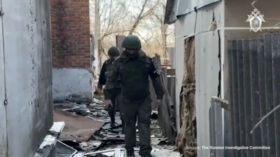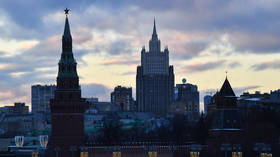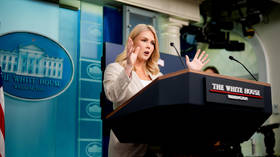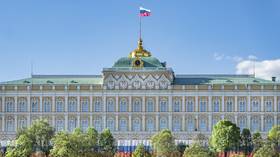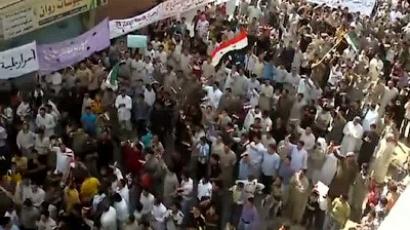Syria would not send troops to protect protesters at OWS – envoy to UN
UN is applying double standards towards Syria, the country’s envoy stated while addressing the General Assembly. He said that his country, like any sovereign state, has exclusive responsibility for maintaining security on its national territory.
“Every sovereign state represented here bears an exclusive right to protect its citizens,” Bashar Ja’afari said, addressing the assembly. “We in Syria could not imagine sending soldiers to defend OWS [Occupy Wall Street] protesters. Neither we nor any other government can imagine sending troops to protect demonstrators in London or Paris.” According to Navi Pillay, the UN human rights chief, who was speaking at the General Assembly on Monday, the Syrian government’s violent crackdown on civilian protesters indicates crimes against humanity have taken place since last March last year and are continuing. She stated that more than 5,400 people were killed last year, among them civilians as well as military personnel who refused to shoot civilians. She also stated that the death toll and the number of those injured are growing daily.However, she admitted that it is impossible to get the exact data on those killed because there is “no access to the country.” Pillay said that within the last two months the UN has not been able to update the number of victims due to extreme difficulties in ascertaining the facts. She also noted that the number of attacks by anti-government militants on Syrian forces has increased. With reference to Syrian government data she said that around 2000 military and security forces personnel have been killed during the unrest.Commenting on a harsh speech by Navi Pillay, the UN High Commissioner for Human Rights, the leader of the Syrian delegation forecast a gloomy scenario planned by the West for his country. “It is known that armed groups are, on a daily basis, committing assassinations against academics, thinkers and intellectuals in all parts of Syria – just as they did in Iraq to destroy the foundation of the state. That is their objective – to push the state towards creative chaos. [In this case] we will have humanitarian corridors because, after all, we have no state; then buffer zones – because there is no state; then a no-fly zone – because there is no state,” said Bashar Ja’afari.He pointed out the main reason for the unceasing violence in Syria is the absence of a valid legal international environment and the lack of respect for the territorial integrity of Syria, adding that the provisions of the UN charter are no longer in force. “Some street names have been changed on Google maps particularly in Homs,” he pointed out. “This is flagrant violation of UN General Assembly resolutions – changing geographic nomenclature. What does Google have to do with the names of streets in Syrian cities?”
Ja’afari also mentioned several times Syria’s coming under attack from terrorist organizations. He questioned why the General Assembly is blaming Syria for defending itself against those attacks.
Meanwhile, US Secretary of State Hillary Clinton has said that the US would “intensify” its diplomatic pressure on the Syrian regime to end its campaign of violence. She made the statement after a meeting with Turkish Foreign Minister, Ahmet Davutoglu. Clinton also noted that both countries would play a “very active role in trying to search for solutions.” She came up with an offer to “assist in the investigations” of the bomb attacks on Israeli diplomats’ cars in India and Georgia.The General Assembly is expected to consider a non-binding resolution similar to the one put to the Security Council, which was vetoed by Russia and China. The plan demands that Assad hands power to his vice president and allows the formation of a unity government to clear the way for elections.
‘Arab and Western countries just want to show they are doing something’
Veteran UN correspondent Ian Williams from New York believes that the General Assembly has met to discuss almost the same resolution as the one which was vetoed by Russia and China about a week ago precisely because it was vetoed – and because the Arab and Western countries want to show that they are doing something.“If they were serious, then they would have pressed for a special emergency General Assembly meeting under the ‘uniting for peace resolution.’ And this, you might remember, filled rich with irony, was the form that the US and Britain used to fight the Korean war in the face of a Soviet veto in the early 1950s. Since then it was resurrected by the Palestinians to bypass the American veto in the Security Council. And that, I presume, is why it is not being evoked now.”Williams also pointed at the fact that there are now some powers saying that resolutions they like are binding and resolutions they don’t like are non-binding. “The Qatari president of the General Assembly could have followed earlier precedent and said there was sufficient support for an emergency special session, but he hasn’t done so, and I’m sure that’s because of the Western pressure. They don’t want to establish the precedent that they consider these resolutions binding because that would be upsetting next time the US veto on the Palestinian resolution.”





